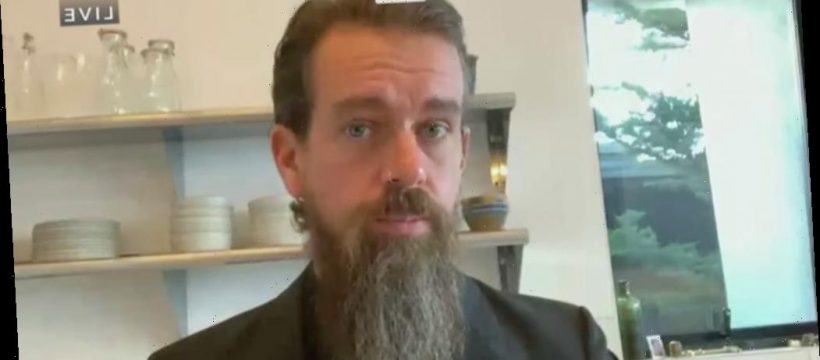The latest Senate hearing facing the CEOs of Twitter and Facebook played out as expected: Republicans complained that the platforms were too aggressive in their moderation practices; Democrats suggested that they have been too lenient to control the flow of misinformation.
That was particularly true as Sen. Dianne Feinstein (D-CA), the ranking member of the Senate Judiciary Committee, queried Twitter CEO Jack Dorsey and Facebook CEO Mark Zuckerberg about President Donald Trump’s false claims that he won the election and of mass voter fraud.
“On November 7th, President Trump tweeted this, ‘I won this election by a lot.’ That is obviously not true. President Trump lost the election. The warning label that Twitter applied to the tweet says, ‘Official sources may not have called the race when this was tweeted. Does that label do enough to prevent the tweet’s harms when the tweet is still visible and is not accurate?”
Dorsey responded, “I believe it is really important that we show people a broader context, and that is the intention of the label. It is not just text below a tweet. It is a link to connect to a much larger conversation and news articles across the spectrum.”
Feinstein later questioned Zuckerberg on their policy to prevent any candidate from trying to delegitimize the result of the election. But she noted that the hashtag #stealthevote and #voterfraud garnered more than 300,000 interactions after Trump falsely declared victory.
“I believe that we have taken some very significant steps in this area, not just the adding additional context to specific posts and making it so that when people search for different hashtags, we show additional information,” Zuckerberg said, adding that they also took the step of putting a “voter information center” at the top of Facebook and Instagram to give users reliable information about the election.
But Feinstein noted that one group, Stop the Steal, was started on Facebook and grew to more than 300,000 users in less than a day, “making it one of the fastest growing groups, I understand, in Facebook history.”
Twitter Launches Disappearing ‘Fleets’ Globally After Tests In Select Markets
She said that although Facebook shut the group down, “substantial damage already had been done.” Some Trump supporters, including those armed with assault weapons, held “Stop the Steal” rallies outside election offices. Two armed supporters from Virginia were arrested on their way to the Philadelphia vote counting center.
“What are your concerns about the spread of misinformation, no matter how innocent it is, or if it is not innocent, like Trump’s claims about the election, that they may incite violence?”
Zuckerberg answered, “Senator, I am very worried about this, especially any misinformation or content that could incite violence, and during such a volatile period like this, one of our top priorities is making sure that people don’t use our platform to organize any violence or civil unrest. That was our basis under which we down that group.”
Republicans, meanwhile, pointed to examples where they say the platforms have over-moderated content.
Sen. Mike Lee (R-UT) cited an instance where, just days before the election, Twitter suspended the account of Mark Morgan, the commissioner of the U.S. Customs and Border Protection office. The tweet in question, Lee said, was one that celebrated the success of the U.S. southern border wall.
“We evaluated this tweet again, and we found that we were wrong,” Dorsey said. “It was a mistake, and it was due to the fact that we had heightened awareness around government accounts.
Lee, though, said that “mistakes happen a whole lot more, almost entirely on one side of the political aisle rather than the other.”
At issue during the hearing is whether changes should be made to Section 230 of the Communications Decency Act. That provision shields social media platforms from liability for third party content, as well as from the way that they moderate their sites.
Earlier, Dorsey acknowledged that changes may need to be made to Section 230, or that there should be some kind of industry wide “self regulation best practices.” Among the proposals are to publish moderation practices, a streamlined appeals process and “best efforts around algorithmic choice.” In a hearing last month, Zuckerberg also said that he was open to the idea of changes to Section 230, even though the tech industry has in the past argued against softening of their liability protections.
Zuckerberg also faced questions of why Facebook had not banned Steve Bannon, Trump’s former chief strategist, who called for the beheading of Dr. Anthony Fauci and FBI Director Christopher Wray.
“How many times is Steve Bannon allowed to call for the murder of government officials before Facebook suspends his account?” asked Sen. Richard Blumenthal (D-CT).
Zuckerberg said that the content in question did violate Facebook’s policies and they took it down, but “having a content violation does not automatically mean your account gets taken down. The number of strikes varies depending on the type of offense. If people are posting terrorist content or child exploitation content, then the first time that we do it then we will take down their account. For other things, it is multiple.”
“Will you commit to taking down that account, Steve Bannon’s?” Blumenthal then asked.
“Senator, no. That is not what our policies would suggest that we should do in this case,” Zuckerberg said.
Read More About:
Source: Read Full Article
